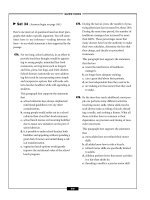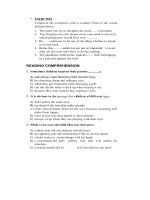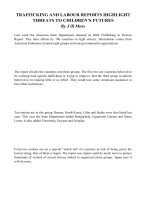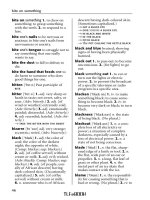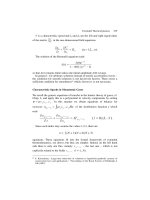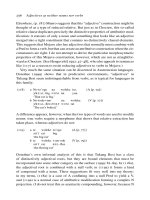Past exams and examination reports 9
Bạn đang xem bản rút gọn của tài liệu. Xem và tải ngay bản đầy đủ của tài liệu tại đây (85.83 KB, 15 trang )
Victorian Certificate of Education
2009
ENGLISH
Written examination
Friday 30 October 2009
Reading time: 9.00 am to 9.15 am (15 minutes)
Writing time: 9.15 am to 12.15 pm (3 hours)
TASK BOOK
Section
A – Text response (Reading and responding)
B – Writing in Context (Creating and presenting)
C – Analysis of language use (Using language to
persuade)
Number of
questions
Number of questions
to be answered
20
4
1
1
1
1
Marks
20
20
20
Total 60
• Students are permitted to bring into the examination room: pens, pencils, highlighters, erasers, rulers
and an English and/or bilingual printed dictionary.
• Students are NOT permitted to bring into the examination room: blank sheets of paper and/or white
out liquid/tape.
• No calculator is allowed in this examination.
Materials supplied
• Task book of 14 pages, including Examination assessment criteria on page 14.
• Three script books: an orange book, a silver book and a blue book. All script books contain unruled
(rough work only) pages for making notes, plans and drafts if required.
Instructions
• Write your student number on the front cover of each script book.
• You must complete all three sections of the examination.
• All answers must be written in English.
• You must not write on two film texts in the examination.
Section A – Text response (Reading and responding)
• Write your response in the orange script book. Write the name of your selected text in the box
provided on the front cover of the script book.
Section B – Writing in Context (Creating and presenting)
• Write your response in the silver script book. Write your Context and the name of your selected text
in the boxes provided on the front cover of the script book.
Section C – Analysis of language use (Using language to persuade)
• Write your response in the blue script book.
At the end of the task
• Place all script books inside the front cover of one of the used script books.
• You may keep this task book.
Students are NOT permitted to bring mobile phones and/or any other unauthorised electronic
devices into the examination room.
© VICTORIAN CURRICULUM AND ASSESSMENT AUTHORITY 2009
2009 ENGL EXAM
2
SECTION A – Text response (Reading and responding)
Instructions for Section A
Section A requires students to complete one analytical/expository piece of writing in response to one
topic (either i. or ii.) on one selected text.
Indicate in the box on the first line of the script book whether you are answering i. or ii.
In your response you must develop a sustained discussion of one selected text from the Text list below.
Your response must be supported by close reference to and analysis of the selected text.
For collections of poetry or short stories, you may choose to write on several poems or short stories, or
on one or two in very close detail, depending on what you think is appropriate.
Your response will be assessed according to the criteria set out on page 14 of this book.
Section A is worth one-third of the total assessment for the examination.
If you write on a film text in Section A, you must not write on a film text in Section B.
Text list
1.
A Man for All Seasons ............................................................................................................. Robert Bolt
2.
Citizen Kane ........................................................................................................... Director: Orson Welles
3.
Collected Stories............................................................................................................... Beverley Farmer
4.
Don’t Start Me Talking: Lyrics 1984–2004............................................................................... Paul Kelly
5.
Generals die in bed .................................................................................................. Charles Yale Harrison
6.
Great Short Works............................................................................................................. Edgar Allan Poe
7.
Hard Times ........................................................................................................................ Charles Dickens
8.
Home ................................................................................................................................ Larissa Behrendt
9.
Inheritance ......................................................................................................................... Hannie Rayson
10. In the Lake of the Woods ....................................................................................................... Tim O’Brien
11. Into Thin Air ......................................................................................................................... Jon Krakauer
12. Look Both Ways ......................................................................................................... Director: Sarah Watt
13. Maestro .......................................................................................................................... Peter Goldsworthy
14. Nineteen Eighty-Four ......................................................................................................... George Orwell
15. Of Love and Shadows .......................................................................................................... Isabel Allende
16. Richard III ................................................................................................................ William Shakespeare
17. Romulus, My Father ........................................................................................................... Raimond Gaita
18. Selected Poems .................................................................................................................. Kenneth Slessor
19. Sky Burial......................................................................................................................................... Xinran
20. The Kite Runner............................................................................................................... Khaled Hosseini
SECTION A – continued
3
1.
2009 ENGL EXAM
A Man for All Seasons
i. More says: “I do none harm, I say none harm, I think none harm”. ‘More’s decision to place his
principles above his family is difficult for a modern audience to understand.’
Do you agree?
OR
ii.
2.
The Steward says: “The great thing’s not to get out of your depth . . .”
To what extent are the characters in the play out of their depth?
Citizen Kane
i. The film-maker shows us Kane in different settings and at different times of life.
How does this help the viewer to understand Kane?
OR
ii.
3.
‘At the end of his life Kane is a friendless recluse.’
Why?
Collected Stories (Beverley Farmer)
i. ‘In these stories, Farmer suggests that things just happen, that people have no control over their
lives.’
Discuss.
OR
ii.
4.
‘The women in these stories are physically and emotionally isolated.’
Do you agree?
Don’t Start Me Talking: Lyrics 1984–2004 (Paul Kelly)
i. ‘The world revealed in Paul Kelly’s lyrics is seedy and the relationships temporary.’
Discuss.
OR
ii.
5.
‘Songs and stories reflect what people value.’
What do Paul Kelly’s lyrics suggest is important and valuable to people?
Generals die in bed
i. How does the narrator in Generals die in bed show that war erases individuality?
OR
ii.
‘Generals die in bed suggests that desensitisation is the price one must pay if one is to survive the
emotional and physical sufferings of war.’
Discuss.
SECTION A – continued
TURN OVER
2009 ENGL EXAM
6.
4
Great Short Works (Edgar Allan Poe)
i. ‘The fate of Poe’s characters is determined by their lack of self-awareness and lack of self-control.’
Do you agree?
OR
ii.
7.
‘The strength of Poe’s writing is his ability to convince readers that an interest in death and dying is
both individual and universal.’
Do you agree?
Hard Times
i. ‘In Hard Times Dickens suggests that it is through compassionate individuals rather than institutions
that people can be helped.’
Discuss.
OR
ii.
8.
‘We see little of Sissy Jupe in the novel, yet she is powerfully significant.’
Discuss.
Home
i. “Lines on paper, like a map, all pointing the way home.”
Why do some characters find their way ‘home’ while others remain lost?
OR
ii.
9.
‘Home is more than a compelling story; it is a political statement.’
Discuss.
Inheritance
i. How does the land influence the relationships in Inheritance?
OR
ii.
‘In a text where truth and deceit are interchangeable, it is the flashback scenes which give the audience
insight into the events.’
Do you agree?
10. In the Lake of the Woods
i. What gives In the Lake of the Woods its undeniable suspense?
OR
ii.
Tony Carbo says: “Defeat does things to people”.
What is O’Brien saying about the effect of defeat on people?
SECTION A – continued
5
2009 ENGL EXAM
11. Into Thin Air
i. In Into Thin Air, how does Krakauer attempt to convince readers that his account of the events on
Everest in 1996 is reliable?
OR
ii.
‘In Into Thin Air the climbers selfishly pursue their own goals. They are not concerned about the
damage they are causing.’
Do you agree?
12. Look Both Ways
i. Nick’s mother says: “Everybody has to find a way to face their own death and life”.
To what extent do the characters in the film achieve this?
OR
ii.
How does Watt’s film represent the inner life of her characters?
13. Maestro
i. ‘Maestro suggests that it is more important to develop and maintain relationships than it is to achieve
success.’
Discuss.
OR
ii.
“First impressions?
Misleading, of course.”
In what ways does Paul’s narration influence the reader’s understanding of Keller?
14. Nineteen Eighty-Four
i. ‘Winston’s relationship with Julia is ultimately responsible for his fate.’
Discuss.
OR
ii.
‘The story of Nineteen Eighty-Four engages us as readers and its social criticism is disturbing.’
Discuss.
15. Of Love and Shadows
i. ‘Allende’s novel is about politics, including the politics of family relationships.’
Discuss.
OR
ii.
“She [Beatriz] had often said that no one disappeared in their country, and that such stories were
anti-patriotic lies.”
Why is ignorance like this necessary for peace of mind in Of Love and Shadows?
SECTION A – continued
TURN OVER
2009 ENGL EXAM
6
16. Richard III
i. ‘Not everyone in the play is as foolish as Richard believes him or her to be.’
How accurate are Richard’s judgments?
OR
ii.
‘For all its emphasis on power, much of the play is actually concerned with powerlessness.’
In what ways is powerlessness important in Richard III?
17. Romulus, My Father
i. “My son is everything to me.”
In the text is this shown to be positive or negative for Raimond’s wellbeing?
OR
ii.
‘Romulus’s problems arise from his European mindset being out of step with post-war Australia.’
Discuss.
18. Selected Poems (Kenneth Slessor)
i. ‘Despite its preoccupation with loss, Slessor’s poetry is not at all melancholy.’
Discuss.
OR
ii.
‘Slessor’s poems reveal his fascination with sound.’
How does Slessor use sound to engage the reader?
19. Sky Burial
i. ‘Sky Burial is more about the living than the dead.’
Do you agree?
OR
ii.
‘In the silence of the Tibetan landscape, Shu Wen learns that communication can take many different
forms.’
Discuss.
20. The Kite Runner
i. ‘We come to terms with the past only when we can forgive ourselves.’
Does your reading of The Kite Runner support this view?
OR
ii.
“I wanted to be just like Baba and I wanted to be nothing like him.”
Does Amir ever resolve this dilemma?
END OF SECTION A
7
2009 ENGL EXAM
SECTION B – Writing in Context (Creating and presenting)
Instructions for Section B
Section B requires students to complete an extended written response.
In your writing, you must draw on ideas suggested by one of the following four Contexts.
Your writing must draw directly from at least one selected text that you have studied for this Context
and be based on the ideas in the prompt.
Your response may be an expository, persuasive or imaginative piece of writing.
If you write on a selected film text in Section A, you must not write on a selected film text in
Section B.
Section B is worth one-third of the total assessment for the examination.
Your response will be assessed according to the criteria set out on page 14 of this book.
SECTION B – continued
TURN OVER
2009 ENGL EXAM
8
Context 1 – The imaginative landscape
1.
Fly Away Peter .................................................................................................................... David Malouf
2.
Island .............................................................................................................................. Alistair MacLeod
3.
Jindabyne ............................................................................................................ Director: Ray Lawrence
4.
The Poetry of Robert Frost .................................................................................................... Robert Frost
Prompt
‘We live in a specific time and place yet, simultaneously, we experience an
internal life that is not limited in this way.’
Task
Complete an extended written response in expository, imaginative or persuasive style. Your writing must draw
directly from at least one selected text for this Context and explore the idea that ‘we live in a specific time and
place yet, simultaneously, we experience an internal life that is not limited in this way’.
OR
Context 2 – Whose reality?
5.
A Streetcar Named Desire .......................................................................................... Tennessee Williams
6.
Enduring Love ...................................................................................................................... Ian McEwan
7.
Eternal Sunshine of the Spotless Mind ........................................................... Director: Michael Gondry
8.
The Shark Net ..................................................................................................................... Robert Drewe
Prompt
‘We do not see things as they are. We see them as we are.’
Task
Complete an extended written response in expository, imaginative or persuasive style. Your writing must draw
directly from at least one selected text for this Context and explore the idea that ‘we do not see things as they
are. We see them as we are’.
OR
SECTION B – continued
9
2009 ENGL EXAM
Context 3 – Encountering conflict
9.
Omagh ...................................................................................................................... Director: Pete Travis
10. The Crucible ......................................................................................................................... Arthur Miller
11. The Line ........................................................................................................... Arch and Martin Flanagan
12. The Secret River ................................................................................................................. Kate Grenville
Prompt
‘It is the victims of conflict who show us what is really important.’
Task
Complete an extended written response in expository, imaginative or persuasive style. Your writing must draw
directly from at least one selected text for this Context and explore the idea that ‘it is the victims of conflict
who show us what is really important’.
OR
Context 4 – Exploring issues of identity and belonging
13. Bombshells .............................................................................................................. Joanna Murray-Smith
14. Sometimes Gladness .............................................................................................................. Bruce Dawe
15. The Catcher in the Rye .......................................................................................................... J D Salinger
16. Witness ........................................................................................................................ Director: Peter Weir
Prompt
‘To be true to yourself in a world that is constantly trying to make you something else
is the greatest achievement.’
Task
Complete an extended written response in expository, imaginative or persuasive style. Your writing must draw
directly from at least one selected text for this Context and explore the idea that ‘to be true to yourself in a
world that is constantly trying to make you something else is the greatest achievement’.
END OF SECTION B
TURN OVER
2009 ENGL EXAM
10
This page is blank
11
2009 ENGL EXAM
SECTION C – Analysis of language use (Using language to persuade)
Instructions for Section C
Section C requires students to analyse the ways in which language and visual features are used to
present a point of view.
Section C is worth one-third of the total assessment for the examination.
Read the opinion piece Keyed In and then complete the task below.
Write your analysis as a coherently structured piece of prose.
Your response will be assessed according to the criteria set out on page 14 of this book.
TASK
How is written and visual language used to attempt to persuade readers to share the point of view of the writer
of Keyed In?
Background information
The following opinion piece appeared in Ctrl Alt, an online journal.
It was posted earlier this year in response to the increasing debate
about the impact of digital technology.
SECTION C – continued
TURN OVER
2009 ENGL EXAM
12
Ctrl
Subscribe
Digital Technology
23 May 2009
Magazine
Alt
Contact us
Voxi >> Keyed In
Keyed In
New ways of doing things always tend to polarise people. Some people are naturally afraid of the new,
challenged by the discomfort of being dislodged from the known, the safe, the predictable, the tried and
the tested – in short, their comfort zone. They take the view ‘if it works, why fix it?’ And maybe they have
a point – sometimes it’s good to take time out and just enjoy what you’ve got.
Other people are fired up by new things. They’re excited by the possibility of the unknown; the further
horizons and the expanding universe really do it for them. They want to grab the future with both hands
and make it happen. They see possibilities for making things better where other people want to chill, just
responding to the pleasure of the moment.
History’s full of moments though, when human beings have been moved forward by people who have been
like the grit in an oyster. Gritty people produce pearls. Well, sort of. They’re the ones who ask questions,
who tinker away in the garage, who turn up on ‘The Inventors’.
In our lifetime we haven’t had a Copernicus or Galileo reorganising the cosmos, or a Darwin challenging
us with a radically new theory of evolution. In a way, what we do have, though, is something that in time
may prove even more dramatic for humankind than the development of writing or printing was.
Out of a garage in the United States has come digital technology – a discovery that is already revolutionising
human experience and the way we live our lives together in the world. Just as the microscope opened up
new worlds, and the telescope let us look at ones that we hadn’t seen so well before, digital technology has
revolutionised the way we communicate with each other and is also promising to revolutionise the way we
learn and think. This is a fundamental challenge to some people who fear that our humanity will be diminished.
Some fear this will reduce human intelligence, replace human memory, displace cognitive function with an
increasingly sophisticated artificial intelligence. For instance, this is what I got from a podcast:
‘. . . the digital world is a world of the here and now, a world of the sound byte, a world
of an instant frozen moment where nothing has consequences, and where everything is
literal. Where nothing has a meaning. You’re not saying one thing in terms of something
else, you’re saying, literally what you see is what you get . . . The brain is what we call
plastic . . . and because of this so-called plasticity . . . every moment you’re alive it’s
modified and changed and revised by every little experience, literally leaving a mark
on your brain.’
Others can appreciate that by connecting digital technology and the human brain, human beings can become
even more intelligent, faster than evolution alone allows. Homo sapiens, who succeeded homo habilis,
might just become homo supersapiens. The adventurous will want to see whether that can happen, will
want to know where we can go, whether we can evolve in such a way that we can solve the riddles of the
universe, find cures faster, find ways of preserving the planet, ending war and violence, feeding the teeming
multitudes and ensuring that people everywhere have the opportunity to lead happy, safe and fulfilling lives
in a free and peaceful world. OK, it’s a dream – but we need dreams as well as this digital technology, the
exciting tool of the modern world.
Why wouldn’t you want it in your life?
SECTION C – continued
13
2009 ENGL EXAM
The impact of that
technology on us, the way
it has the power to change
the way we think, the
potential it offers to us for
enhancing our lives: these
are things which people of
our generation just accept
and use with enthusiasm.
It’s older people who are
less familiar with it who are
Due to copyright restriction,
suspicious about it, or even
this material is not supplied.
afraid. What’s to be afraid
of? Our minds take in
information the way the Net
distributes it: in a swiftly
moving stream of particles.
Once scuba divers drowning
in a sea of words, we now
zip along the surface like jet
skiers.
Global shopping, online
banking, working out the
itinerary for your holiday, looking up Google Maps and Street View to check out where your friends live,
and that’s not to mention Facebook and keeping in touch and keeping up: these are fantastic advantages
which have already proved themselves. Sure, some people stress about privacy issues, but these can be
resolved. Google is not allowed to film defence sites from Google cars and Google bikes. Let’s face it, the
pictures we see are not real-time images. You can protest about them anyway and get them removed or
pixellated if you’re really worried. Besides, the hot air balloon people are always hovering over my back
yard and looking into my windows too.
Why go to a library when you can sit at your desk and look up Wikipedia or Google Scholar, or Ask Jeeves?
Besides, people who wouldn’t normally go to a library actually do that – that’s a win.
If people stopped learning tables and using log books when calculators came in, then that’s because something
better turned up. They didn’t stop using their brains; they just used their brains for different things, like
inventing the Net!
Let’s be excited – keep being excited. We’d still be swinging in the trees or huddling in caves if we’d taken
the view that new things are harmful or dangerous or unpredictable. The ever-expanding Googleness of the
universe means that we’re better informed, know more about each other, can push back the boundaries of
darkness and ignorance and like the people who struck rocks together and found the magic of a spark, and
then learned how to repeat and use that experience or discovery, people who are digital savvy, and aren’t we
all, are heading for the 22nd century in a spirit of optimism. Bring it on, I say. If you don’t agree, you can
always put your computer on eBay and buy a stack of stationery with the money, if that’s your thing, but what
a loser you’d be. Like wireless, it’s about getting faster and more efficient, being in touch and connected.
The future is here now, and I pretty much like the look of it.
Voxi
END OF SECTION C
TURN OVER
2009 ENGL EXAM
14
Examination assessment criteria
The examination will address all the criteria. All student responses will be assessed against each
criterion.
The extent to which the response is characterised by:
Section A – Text response (Reading and responding)
• detailed knowledge and understanding of the selected text, demonstrated appropriately in response
to the topic
• development in the writing of a coherent and effective discussion in response to the task
• controlled use of expressive and effective language appropriate to the task
Section B – Writing in Context (Creating and presenting)
• understanding and effective exploration of the ideas, and/or arguments relevant to the prompt/stimulus
material
• effective use of detail and ideas drawn from the selected text as appropriate to the task
• development in the writing of a coherent and effective structure in response to the task, showing an
understanding of the relationship between purpose, form, language and audience
• controlled use of language appropriate to the purpose, form and audience
Section C – Language analysis (Using language to persuade)
• understanding of the ideas and points of view presented
• analysis of ways in which language and visual features are used to present a point of view and to
persuade readers
• controlled and effective use of language appropriate to the task
END OF TASK BOOK
